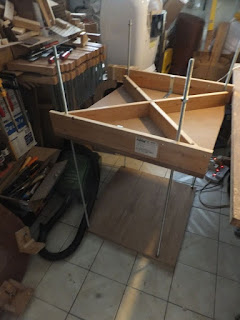20150720
Bracing is perhaps the more enjoyable part of the build.
First I lightly sand the top on the gluing side.
Then I draw the outline of the template onto the top at the bracing side.
This is followed by the bracing marking.
For this tops I am using my bracing which is derived from Bouchet.
After the bracing markings are done, the I started to glue in the bracing.
For the brace blanks I have already prepared and cut previously.
Before that I took some time to assemble my go-bar deck.
I did some modifications to the upper deck which block some holes from the threaded rod so I have to enlarge the holes a bit.
But that was done pretty quick.
After the go-bar is set up, I began to heat up the hide and the gluing process.
First I glue in the donut sound hole reinforcement.
I had to cut out the inner circle first and lightly sand the piece.
Following that I cut the braces to size according to the layout which I had drawn.
Then I glue in one by one.
I have enough go-bars to press in all the fan brace at once.
Anyway I think I should make some more go-bars...
After sometime all the fan are braced up.
I check and make sure no gaps.
This is very crucial as the bracing directly will affect the sound of the guitar.
Now to wait for it to dry...
20150722
After the glue dried, I began to shape the bracing.
The process is quite simple also.
First I make reduce the height of the bracing to the predefined height and then make the cross-section profile into triangular shape.
Finally I shape the longitudinal profile to a parabolic at the 2 ends.
After that I also profile the reinforcement ring too.
20150724
I continue the brace gluing; this round is the 2 side braces and the end closing brace.
I also marked out the curvature for the bouchet brace.
As it's a massive brace, the method will not be press to make it conform like the smaller fan braces.
Instead the bottom arc will be planed into the Bouchet traverse brace itself.
The tricky part will be fitting over the fan braces.
20150727
After the glue dried I carved the braces.
Also I traced the doming arc onto the Bouchet traverse brace.

Braces carved. The weight of top is about 150++g now. After the 2 Traverse brace and Bouchet brace is on, I will try to reduce the overall weight. My guess is that it should be under 200g in total.
20150805
I began to fit the Bouchet brace notches to the fan braces.
The profile can be tricky but with patience it can be done easily.
First I profile the bottom of the brace to the solera doming
After I shoot the base with a block plane and check the fit to the doming.
Then I mark the peak of the triangle of the center brace on the bottom of the Bouchet brace.
I saw a little and chisel a small notch on the bottom of the brace.
Note that the bouchet brace will touch the center brace 1st by virtue of the convex shape.
Thus will do the notches one by one and adjust and deeepn the notches accordingly.
The simple rule is to parr away the wall of the notch which touches the triangle of the fan braces.
Adjust all the notches until the fit is OK.

All fitted nicely.
The 2 stops behind is to help position the Bouchet brace and to hold the dome of the top also.
(一石二鳥 【イッセキニトリ】, Kill 2 Birds with 1 stone)
20150814
Now to the gluing of the traverse braces.
The hard part of fitting the braces has been done so this is actually quite straightforward.
Except one part which I need to add some extension to the go-bar top part.
When I position the stopper for the Bouchet brace I shifted the solera forward for easier access.
But now the UTB is out of the top deck's range... so I can't possible use go-bar for gluing the UTB.
I tried using cam-clamp but it tends to tilt the braces forward...
So I clamp and extension of the top deck to allows the go-bar and it works like normal.

LTB. You can see that the blocks which are glued to the tops are either slanted or curved so that they do not stress on a single grain line on the top.
20150819
The braces are carved and sanded.
After that I weigh the top is about 196.5g heavier than my #3 but still within reasonable variation limits.
I did some frequency analysis too, but it's off my reference seems like I need to remove a bit more of the brace's height.
20150903
I am preparing for the next stage.
Right now the top is tuned and sides are ready.
Here's some pics of the assembly preview.


















































No comments:
Post a Comment